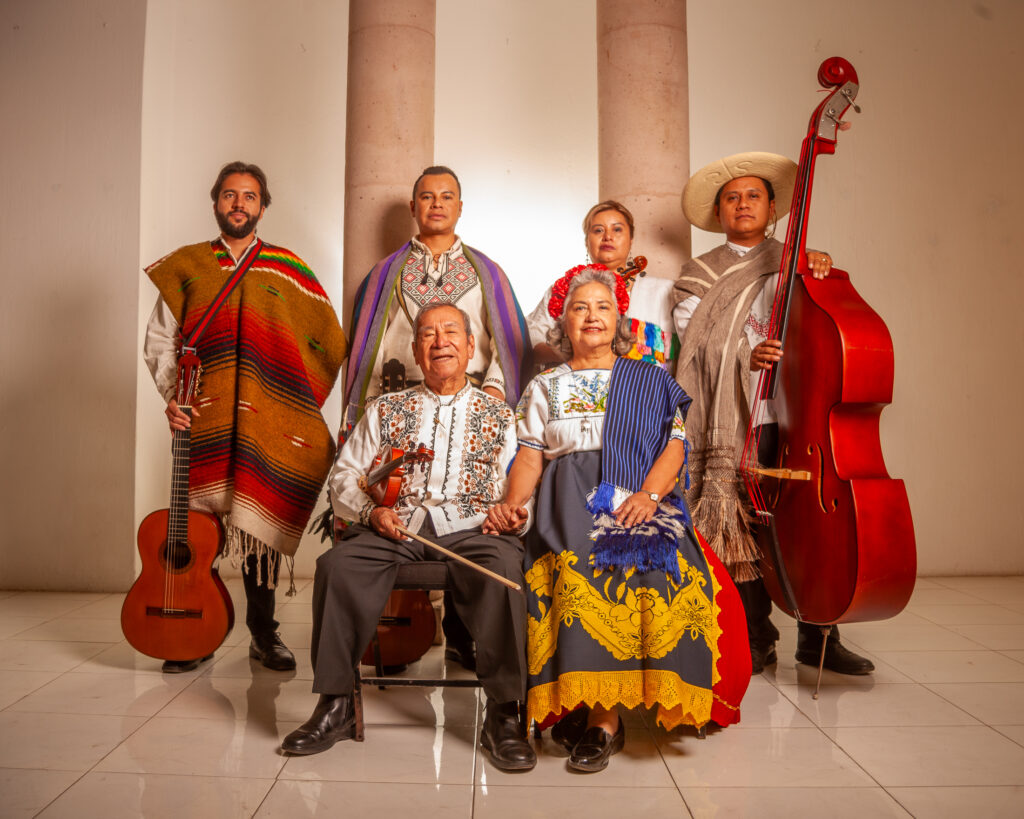In a town where legends breathe and nostalgia sings, lives the story of a man whose life has become one with the music of his homeland. Francisco Bautista Ramírez—affectionately known as “Panchito”—is a living witness to the Purépecha tradition, a craftsman of sound who has woven the soul of Paracho and its surrounding communities into melodies tinged with longing and hope.
First notes from the mountains
It all began in 1948, when a young Francisco, eyes full of dreams and a heart hungry for harmony, entered the world of music theory. It was then that he had the fortune to study under Emilio Valerio, a gifted clarinetist from Paracho and disciple of the great Jesús Valerio Sosa—one of the most revered musicians in the region’s history. Jesús, composer of Año Musical de la Sierra, had collected melodies that seemed to rise straight from the heart of the land—pieces like Flor de Canela and the traditional Corpus.
Those early lessons took place in don Emilio’s troje, a wooden attic room where, amid the whispering wind and creaking floorboards, the notes of piano and cello floated through the air. It was there that young Francisco began to understand that music was more than sound—it was memory, it was a dream, it was a connection to one’s roots. Not long after, he joined Grupo Erandi, performing alongside his brothers—Joaquín, Juan, Javier, and Carlos—under the direction of their father, Francisco Sr., who guided their first steps along a path of discipline, tradition, and love for their culture.
Echoes of tradition
Don Panchito has long believed that the music of the four Purépecha regions is essential to understanding his people’s identity. He recalls with vivid emotion the moments when, carried by old songs and new harmonies, all boundaries dissolved and the spirit of the Purépecha came alive in every note. In his own words:
“What inspired me was realizing that the mountains were a vital part of Purépecha music. Then I heard the works of my teacher Emilio Valerio. The music of the sierra has a poetic sadness… and a joy that borders on ecstasy.”
These words ring true in the silence of the countryside, where water is scarce and the soil is hard, yet where life blooms in unexpected moments of celebration. While the lake region rejoices in its abundance—its water, flowers, and vibrant traditions—the highlands carry the voice of the volcano and the dry earth, each melody a sigh, an echo of what was and what will always be.
As a young man, Francisco learned to hear the many voices of his land. “When I started with Grupo Erandi alongside my brothers,” he recalls, “we were inspired by music from Aranza, Zacán, Ahuiran, Nahuatzen… but especially by the music of Sevina, which is deeply expressive and melancholic. The lake region is more festive—why? Because they have everything: water, flowers, fish, beauty… it all shapes their spirit. In the mountains, we didn’t even have water. Our land was poor for agriculture, and on top of that, we lived near the volcano. That’s where Paracho’s melancholy comes from—and that’s what I try to express in my music.”
In between rehearsals and family gatherings, the young musician began to shape his sound, blending nostalgia with resilience in every measure. Conversations were filled with the names of great composers who had left their mark on the region’s musical heritage. “Here in Paracho, beyond Jesús Valerio Sosa, we had remarkable talents like Aristeo Mercado, Francisco Sosa, Don Cesáreo Sosa. Around Lake Pátzcuaro, I was lucky to meet Nicolás Bartolo Juárez, his cousin Emilio López Bartolo, Rafael Trinidad Bartolo from Janitzio, Tata Gabito Secundino from San Andrés Tziróndaro. From our highlands: Juan Victoriano of San Lorenzo, Juan Crisóstomo and Francisco Salmerón from Quinceo, Tata Cruz Jacobo from Sevina, Hernando Hernández from Ahuiran, Doroteo and Arturo Equihua from Aranza, the Granados family from Ichán, and Tata Domitilo Alonso from Tiríndaro. So many more I can’t name at the moment—but I admire them all deeply.”
Don Panchito’s words carry the warmth of stories passed down by firelight, honoring the masters who shaped the musical soul of the Purépecha people.
Paths across the world
Destiny led Don Panchito and Grupo Erandi down roads both familiar and new. In 1973, the group embarked on a journey that would forever mark their musical lives: a tour to China. In Beijing’s majestic Great Hall of the People (人民大会堂), President Luis Echeverría himself hosted a cultural gathering that brought East and West into harmonic dialogue. The memory of that journey lives on in Panchito’s heart, a breath that crosses continents and speaks to the universality of music.
Soon after, their travels took them to the United States and Europe—Paris, Copenhagen, and Prague became stages for this cultural exchange. In distant lands, some of their compositions found special resonance. Songs like Cara de Pingo, Arriba Pichátaro, and El Aplauso (by Nicolás Bartolo) captivated audiences, leaving behind the sound of a tradition that, though far from home, remained alive in the pulse of every town they visited.
Revival of legacy
As years passed, Francisco Bautista Ramírez became increasingly intertwined with the very history of Purépecha music. Each concert, each trip, solidified his role as a guardian of an extraordinary cultural treasure. His work with institutions such as the Escuela Popular de Bellas Artes at the Universidad Michoacana de San Nicolás de Hidalgo and the National Conservatory of Music, along with his time performing with the iconic Ballet Folklórico de México, established him as a true ambassador of his heritage.
But Don Panchito’s mission extended beyond performance. In 1989, driven by the belief that music is the soul of his people, he founded Grupo Purhembe—a family ensemble dedicated to preserving and spreading the Indigenous musical legacy of the region. Composed largely of his own relatives, the group has recorded several albums, including Sentimiento de un Pueblo and Con Aroma a Nuriten, and has become a cultural reference point not only in Michoacán but throughout Mexico.
He has also dedicated himself to teaching, serving as music advisor for the Ballet Folklórico de Michoacán and as a violin instructor at Morelia’s Casa de la Cultura.

Echoes of the Past in the Present
Not long ago, I had the chance to sit down with Don Panchito, to take a few photographs alongside him and his family. In that encounter, I noticed how every gesture, every smile, felt like a silent tribute to a tradition that refuses to fade away. For him, music is not just a sequence of notes — it’s a bridge that links the past with the present.
As he shared his memories, Don Panchito reminded us that, within his vast repertoire, he holds no single favorite composition. When asked, he responds with a humility that speaks volumes of the greatness within him:
“I couldn’t say. It would be unfair to the other pieces. I prefer to believe that all music composed is excellent. I enjoy the little sones, but I can’t say one is more beautiful than another — each one has its own charm.”
Simple and sincere, his words reflect a deep conviction: that every song, every melody, is a treasure that enriches the identity of his people. It is within that diversity of sound that true cultural wealth resides — in the harmony of differences, in the fraternal embrace of all the voices that sing life into being.
A Story That Still Resonates
The story of Francisco Bautista Ramírez is a living legend—told in whispers and chords in the corners of Paracho and beyond. From his humble beginnings in the sierra, shaped by drought and volcanic soil, to international stages across Asia and Europe, every chapter of his life speaks to the power of tradition to transcend time and space.
Today, as one walks through the streets of Paracho, the echoes of old melodies still linger in the air. The wind that sweeps across the fields carries fragments of songs, and in every corner, the indomitable spirit of a people proud of their roots can be felt.
As I look through the photographs captured that day, I realize that what truly remains is that unbreakable connection—to the land, to history, to the soul of the Purépecha. In both word and silence, music becomes the universal language that tells the story of a past shaped by struggle, and a future filled with life.
In the simplicity of his stories and the depth of his memories, Don Panchito Bautista invites us to pause, to listen, and to let tradition speak. It is a call to cherish the humble, the genuine—and to remember that in every note lives the spirit of a people who have found beauty in hardship, and constancy in their roots.







